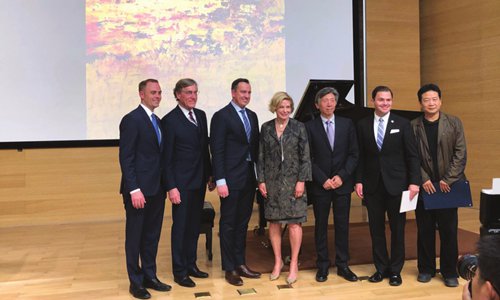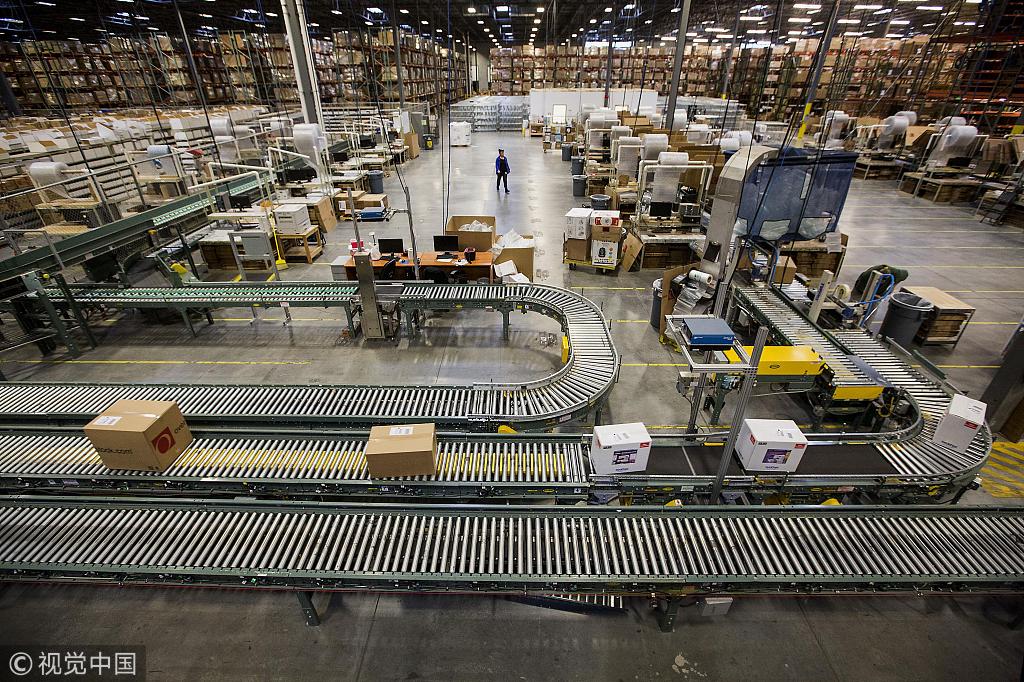US state-level governments and US' private sector have strong will of continuing to do business with China amid the China-US trade war, officials and business representatives told the Global Times in recent interviews, and they also urged the Trump administration and the Congress to improve economic ties with China instead of escalating tariffs.

The Utah delegation at an event in Beijing on Thursday (Photo: Courtesy of Dan Stephenson, executive director of Economic Bridge International)
Amid escalating China-US trade tensions, a high-level delegation, consisting of business and government leaders from the US state of Utah, concluded a six-day visit to Shanghai and Beijing on Saturday. The delegation aims to continue to build bridges and demonstrate that the relationship between Utah and its Chinese partners is strong and growing - regardless of what China hears from the White House.
Greg Hughes, speaker of the Republican House of Representatives of the state of Utah, said the message this trip sends to China is "Utah is not like Washington DC; we are China's friends, and have been for a long time."
There are Utah businesses that have "felt the tariffs and the change of relationships," and it becomes more expensive for them to do business in China, he told the Global Times on Wednesday. "People are really concerned with that. We want to improve the situation."
Their Shanghai trip covered meetings with officials of the Jiading district of Shanghai and the Shanghai Port, as well as representatives from Chinese and US companies. In Beijing, the delegation attended high-level events and met with Chinese officials and representatives in trade, commerce, education and culture.
Utah is not alone in showing a strong will of continuing to do business with China. Other states, including California, Michigan and Kansas, spoke out about their differences against the Trump administration's trade war with China.
On August 30, the California State Legislature passed a bill that actively supports trade with China, the People's Daily Online reported, urging the US President and the Congress to support strengthening economic connections between the two countries.

Employees work at the distribution center of US online retailer Overstock.com Inc in Utah. The company is now cooperating with China's online retail store JD.com Inc. (File photo: VCG)
Through efforts at the state level, Utah will show the Trump administration a different, more effective way, Hughes pointed out.
"We think Utah can be a good example to show other states and our federal government that we have a lot of interests that overlap, and that we can work together," he said.
Voice on the state level
Hughes had made several trips to China in the past few years and he also considered this year's meetings with provincial leaders and business representatives to be very productive. He especially spoke highly of the meeting with the Shanghai Port.
"The meetings with Shanghai Port were very valuable for us," he said. The developing inland port of Utah, which links airports, freeway systems and rail hubs, aims to position the state at the center of world trade.
"We know that our global supply chain is important. Utah is very committed to that. It's important that Utah has long-standing and good relationships with China," he noted.
Initially built on farming and mining, the state of Utah now boosts one of the most diverse economies in the US, from IT and biotech to life science and aerospace manufacturing. For Utah, China is a large export market, and analysis by the World Trade Center Utah showed that the state's economy would take a hit from the tariffs, on its exports, commodity prices and expansion opportunities for Utah companies that are emerging into the Chinese market.
The primarily affected industries are aluminum recycling, ranchers and beef processing, plastics manufacturing, and agriculture, according to World Trade Center Utah. The competitive position of Utah's aerospace manufacturing would also be affected by losing one of the world's fastest-growing air travel markets.
Cultural and educational communication between China and Utah is also rising, said Hughes. With the implementation of the Dual Language Immersion program in the state, Utah has the largest number of students learning Chinese in the country.
Opportunities for new partnerships in trade and investment can be built in three key sectors of Utah's economy: life sciences, IT and minerals, according to Miles Hansen, president and CEO of the World Trade Center Utah. Hansen and his center works with both the state of Utah and the private sector to help increase exports and investment.
"Due to the trade war, there have been costs on all sides. Some Utah companies have had a difficult time adjusting, whose supply chains require importing from and exporting to China," Hansen said. "We believe in engaging positively on a broad range of issues, and developing strong relationships," he said.
Minds of the businesses
Richard Hartvigsen, vice president of Nu Skin Enterprises, considered the message he got on this trip from Chinese businesses and potential partners as "very positive."
"On the federal level, people may hear more about the conflict. But when get down to the companies, we have wonderful relationships with China," he said. "People of the companies who do business in China would like to see the trade tension go away."
According to Hartvigsen, China is the company's largest overseas market and it sells approximately $1 billion in products annually. "It's hard for us in any way to be supportive of the trade dispute," he noted.
Speaking of Trump's trade policy, Hartvigsen said that there would be better ways to resolve the China-US trade issue. He pointed out that both economies are "too important to each other to let this kind of dispute drive us apart."
"I think cooperation, face-to-face discussions and figuring ways to work things out will work better," he said.
"One of the things our companies have done is that we have spoken out against the escalation of the trade dispute. We've been in communication with our US government. We were not supportive of this particular way of resolving the dispute," he said.


